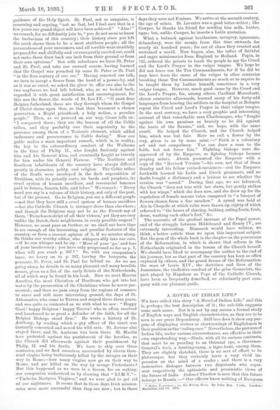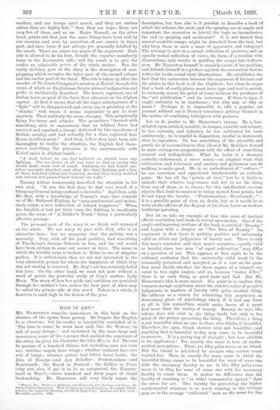A NOVEL OF INDIAN LIFE.* WE have called this story
"A Novel of Indian Life," and this is, perhaps, the best description of it ; the sub-title suggests some such name. But it is not by any means a formal study of English ways and English characteristics, as they are to be seen in our great Dependency. Still less does it show any pur- pose of displaying virtues or shortcomings of Englishmen in their position as the "ruling race." Nevertheless, the pictures of Indian life, under various circumstances, are effective in their own unpretending way,—Simla, with all its curious contrasts, that must be so puzzling to an Oriental eye, a Governor- General's /nee, a hunting-camp, a tiger-hunt, among them. They are slightly sketched, there is no sort of effort to be picturesque, but they certainly leave a very, vivid im- pression on the mind of a reader ; and there is a very instructive dialogue between two disputants who repre- sent respectively the optimistic and pessimistic views of the future of India Colonel Thurlow is sure that this future belongs to Russia :—" Our officers know nothing of European _ • Helen T.everyirt : or, the Ruling Race. By John Roy. 8 vols. London ; Macmillan and Co, 1892.
warfare, and our troops can't march, and they are useless unless they are highly fed ; " then they are boys ; there are very few of them, and so on. Major Russell, on the other hand, points out that just the same things have been said by our enemies, and even by ourselves, of our armies in times past, and have been, if not always, yet generally falsified by the result. There are about ten pages of the argument. Each side is allowed to do his best, though the reporter manifestly
leans to the favourable side ; and the result is to give the reader an admirable pre'cis of the whole matter. But the really striking part of the story is the description of cam-
paigning which occupies the latter part of the second volume and the earlier part of the third. The tale is taken up after the murder of Sir Louis Cavagnari's mission at Kabul, though this event, of which no Englishman thinks without indignation and pride, is incidentally described. The hero's regiment, one of Indian horse, is part of the force that advances on the Afghan capital. At first it seems that all the eager anticipations of a " fight " will be disappointed, and every one is growling at the " skunks " with whom it seems impossible to get to close quarters. Then suddenly the scene changes. This perpetually flying foe turns and attacks. The grumblers "learned with something akin to amazement that an Afghan force had received and repulsed a charge delivered by two squadrons of British cavalry, and had actually, for a time, captured four Horse-Artillery guns." And then, before they have been able thoroughly to realise the situation, the English find them- selves something like prisoners in the cantonments, with Kabul again in Afghan hands :—
" A week before no one had believed we should have any fighting. The one desire of all had been to find an enemy who would make some sort of stand. Suddenly we had found our- selves savagely attacked, and, after five days' fighting and a loss of three hundred killed and wounded, we had been fairly mobbed into retreat and pressed back behind our walls."
Tommy Atkins humorously described the situation in his
own way, "It was the first time he had ever heard of a blooming General being confined to barracks." And then, adds Mr. Roy, with a knowledge of Tommy's ways that reminds us of Mr. Rudyard Kipling, he "sang sentimental and melan- choly songs, a sure indication of inward happiness." When the English at last get their turn, the fighting is excellently given, the scene of "A Soldier's Death" being a particularly effective passage.
The personal part of the story is, we think, well managed on the whole. We are sorry to part with Guy, who is an attractive hero ; but we recognise that the parting was a necessity. Guy, with all his good qualities, had something of Thackeray's George Osborne in him, and the evil would have been certain to come out sooner or later. The scene in which the terrible news is broken to Helen is one of singular pathos. It is unfortunate that we are not interested in the very admirable person for whom the happiness of which Guy was not worthy is reserved. Mr. Roy's art has certainly failed him here. On the other hand, we must not pass without a word of praise the powerful study of Guy's mother, Lady Mary. The story of how her pride and ambition are punished through her mother's love, makes the best part of what may be called the private side of this novel. Taken as a whole, it deserves to rank high in the fiction of the year.



































 Previous page
Previous page